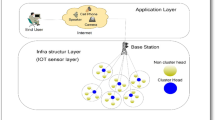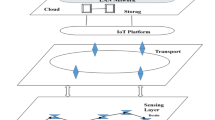Abstract
Opportunistic routing is crucial for the development and management of an efficient and flexible network in Internet of Things (IoT) assisted wireless sensor network (WSN). Sensor nodes are dispersed over a large region and collect data from the surroundings. Data is analysed rather than sensed before being transferred via an established route to the base station (BS). Being a resource constrained network; overhead problems manifest. The energy consumption and subsequently, quick demise of nodes employed for data detection and transmission is major issue. Many other kind of network problems also arise in these constrained networks due to deadlock and livelock. Deadlock could occur if two nodes are trying to access the same data or resource simultaneously and neither can proceed until the other node releases it. This can lead to a complete halt in network operations, as nodes are unable to communicate or exchange data. The very purpose of deploying a network fails. Livelock could occur if two nodes are repeatedly sending messages to each other in response to previous messages, but none of the messages are leading to a resolution of the issue. This can lead to excessive use of network resources and can also cause a complete halt in network operations if the network becomes overloaded with traffic. This paper addresses the problem of deadlock and livelock in the context of IoT assisted WSN and proposed a novel approach based on the Adaptive meta-heuristic based Clustering and Routing Algorithm for IoT-assisted wireless sensor network (ACRA) to solve it. The primary contributions for the proposed method in such a context are: (1) Reduce Wastage of resources so that energy consumption is minimized (2) No single node stuck in the loop and thus removes hotspot problem (3) Use of alternate optimal path without getting stuck into a single path and finally, (4) the event must cover a large region. Two algorithms are proposed in ACRA including (1) the inter-deadlock avoidance clustering algorithm (INDCA) and (2) the intra-deadlock avoidance routing algorithm (INDRA). Both algorithms construct an optimal route and cover a large region. The proposed algorithm performance is compared with other similar algorithms on essential parameters such as the Packet Delivery Ratio (PDR), number of active nodes, and Average residual energy (ARE). The simulation results show that the proposed algorithm considerably outperforms its competitive techniques in terms of energy efficiency while at the same time addresses deadlock and livelock problems in a robust manner.








Similar content being viewed by others
Data availability
Available on request.
References
Majid M, Habib S, Javed AR, Rizwan M, Srivastava G, Gadekallu TR, Lin JCW (2022) Applications of wireless sensor networks and internet of things frameworks in the industry revolution 4.0: a systematic literature review. Sensors 22(6):2087
Altowaijri SM (2022) Efficient next-hop selection in multi-hop routing for IoT enabled wireless sensor networks. Future Internet 14(2):35
Gurupriya M, Sumathi A (2022) HOFT-MP: a multipath routing algorithm using hybrid optimal fault tolerant system for WSNs using optimization techniques. Neural Process Lett 1–26
Ranga V, Dave M, Verma AK (2016) Optimal nodes selection in wireless sensor and actor networks based on prioritized mutual exclusion approach. Kuwait J Sci 43(1)
Seetharaman G, Pati D (2022) Reliable fault-tolerance routing technique for network-on-chip interconnect. Intelligent Sustainable Systems. Springer, Singapore, pp 767–775
Karaata MH, Dabees A, Alazemi F (2022) A reliable concurrent multicast algorithm for content distribution. J Supercomput 78(8):10542–10574
Gupta SK, Kumar S, Tyagi S, Tanwar S (2022) SSEER: segmented sectors in energy efficient routing for wireless sensor network. Multimed Tools Appl 1–19
Gola KK, Gupta B (2022) Void Node avoidance in underwater acoustic sensor network using black widow optimization algorithm. Ad Hoc Sens Wirel Ne 52
Saha S, Chaki R (2021) QoS-based congestion evasion clustering framework of wireless sensor networks. Kuwait J Sci
Quy VK, Nam VH, Linh DM, Ban NT, Han ND (2021) A survey of QoS-aware routing protocols for the MANET-WSN convergence scenarios in IoT networks. Wireless Pers Commun 120(1):49–62
Mehra PS (2022) E-FUCA: enhancement in fuzzy unequal clustering and routing for sustainable wireless sensor network. Complex Intell Syst 8(1):393–412
Moussa N, El Belrhiti Alaoui, El A (2021) An energy-efficient cluster-based routing protocol using unequal clustering and improved ACO techniques for WSNs. Peer Peer Netw Appl 14(3):1334–1347
Senthil GA, Raaza A, Kumar N (2022) Internet of Things energy efficient cluster-based routing using hybrid particle swarm optimization for wireless sensor network. Wireless Pers Commun 122(3):2603–2619
Mansour RF, Alsuhibany SA, Abdel-Khalek S, Alharbi R, Vaiyapuri T, Obaid AJ, Gupta D (2022) Energy aware fault tolerant clustering with routing protocol for improved survivability in wireless sensor networks. Comput Netw 109049
Sadrishojaei M, Navimipour NJ, Reshadi M, Hosseinzadeh M (2022) A new clustering-based routing method in the mobile internet of things using a krill herd algorithm. Clust Comput 25(1):351–361
Al-Otaibi S, Al-Rasheed A, Mansour RF, Yang E, Joshi GP, Cho W (2021) Hybridization of metaheuristic algorithm for dynamic cluster-based routing protocol in wireless sensor Networksx. IEEE Access 9:83751–83761
Rathore RS, Sangwan S, Prakash S, Adhikari K, Kharel R (2020) Cao Y (2020) Hybrid WGWO: whale grey wolf optimization-based novel energy-efficient clustering for EH-WSNs. EURASIP J Wirel Commun Netw 1:1–28
Pitchaimanickam B, Murugaboopathi G (2020) A hybrid firefly algorithm with particle swarm optimization for energy efficient optimal cluster head selection in wireless sensor networks. Neural Comput Appl 32(12):7709–7723
Chaurasia S, Kumar K, Kumar N (2023) MOCRAW: a meta-heuristic optimized cluster head selection based routing algorithm for WSNs. Ad Hoc Netw 103079
Mirjalili S (2016) Dragonfly algorithm: a new meta-heuristic optimization technique for solving single-objective, discrete, and multi-objective problems. Neural Comput Appl 27(4):1053–1073
Albu-Salih AT, Khudhair HA, Hilal OM (2022) Data acquisition time minimization in FANET-based IoT networks. Kuwait J Sci 49(1)
Author information
Authors and Affiliations
Contributions
Equally contributed.
Corresponding author
Ethics declarations
Ethical approval
Not applicable.
Consent to participate
Not applicable.
Consent to publish
As per journal policy.
Conflict of interest
No conflict of interest.
Additional information
Publisher's Note
Springer Nature remains neutral with regard to jurisdictional claims in published maps and institutional affiliations.
Rights and permissions
Springer Nature or its licensor (e.g. a society or other partner) holds exclusive rights to this article under a publishing agreement with the author(s) or other rightsholder(s); author self-archiving of the accepted manuscript version of this article is solely governed by the terms of such publishing agreement and applicable law.
About this article
Cite this article
Chaurasia, S., kumar, K. ACRA: Adaptive meta-heuristic based Clustering and Routing Algorithm for IoT-assisted wireless sensor network. Peer-to-Peer Netw. Appl. 16, 2186–2201 (2023). https://doi.org/10.1007/s12083-023-01505-w
Received:
Accepted:
Published:
Issue Date:
DOI: https://doi.org/10.1007/s12083-023-01505-w




